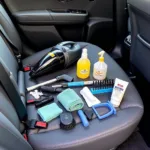A car mechanic’s toolbox is their arsenal. Having the best tools for a car mechanic is crucial for efficient diagnostics and repairs. This guide explores the essential tools every mechanic needs, from basic hand tools to advanced diagnostic equipment. We’ll cover everything you need to know to equip yourself for success in the automotive repair industry.
Essential Hand Tools Every Mechanic Needs
Every mechanic starts with a foundation of hand tools. These are the workhorses of your trade, allowing you to tackle a wide range of tasks. A comprehensive set should include:
- Wrenches: A variety of sizes and types, including combination wrenches, open-end wrenches, and adjustable wrenches, are essential for loosening and tightening bolts and nuts.
- Screwdrivers: Phillips head, flathead, and Torx screwdrivers are needed for various screw types found in vehicles.
- Pliers: Needle-nose pliers, slip-joint pliers, and locking pliers are invaluable for gripping, bending, and cutting wires and other small components.
- Sockets and Ratchets: These tools provide leverage and speed when working with fasteners, especially in tight spaces.
- Hammers: A ball-peen hammer and a dead blow hammer are useful for various tasks, including removing stuck parts and shaping metal.
These tools are the backbone of any mechanic’s kit. See our guide on the best car mechanic tools for a detailed breakdown of essential hand tools.
Power Tools for Enhanced Efficiency
While hand tools are essential, power tools significantly enhance efficiency. Investing in quality power tools can save you time and effort. Consider these additions to your arsenal:
- Impact Wrench: Quickly removes and tightens lug nuts and other stubborn fasteners.
- Drill: Essential for creating holes and driving screws. A cordless drill offers greater portability.
- Grinder: Used for removing rust, smoothing welds, and cutting metal.
- Sander: Useful for smoothing surfaces and preparing parts for painting.
- Air Compressor and Air Tools: Provides compressed air for various tools, including impact wrenches, air ratchets, and spray guns.
Power tools like these can dramatically improve your workflow. Check out our recommendations for the best car mechanic power tools for a deeper dive.
Diagnostic Tools for Accurate Troubleshooting
Modern vehicles rely heavily on electronic systems. Therefore, diagnostic tools are crucial for identifying and resolving issues. Key diagnostic tools include:
- OBD-II Scanner: Reads diagnostic trouble codes (DTCs) from the vehicle’s computer, providing insights into potential problems. You can even find useful car scan tools app for mobile diagnostics.
- Multimeter: Measures voltage, current, and resistance, helping diagnose electrical problems.
- Oscilloscope: Displays voltage waveforms, allowing for detailed analysis of electrical signals.
- Pressure Gauges: Measure fluid pressure in various systems, such as the fuel system, cooling system, and brake system.
- Vacuum Gauge: Measures engine vacuum, providing information about engine performance and potential issues.
“A comprehensive set of diagnostic tools is essential for any modern mechanic. Without them, you’re working in the dark,” says John Miller, a seasoned automotive diagnostician with over 20 years of experience. “Investing in these tools is an investment in your ability to provide accurate and efficient repairs.”
Organization and Storage: Keeping Your Tools Accessible
A well-organized toolbox is essential for efficient work. Consider using a car tools in a zip pouch for smaller tools and a rolling tool chest for larger items. Keeping your tools organized will save you time and frustration.
What are the must-have tools for a beginner mechanic?
Starting with a basic set of hand tools, including wrenches, screwdrivers, pliers, and sockets, is crucial for beginners. An OBD-II scanner is also highly recommended for diagnosing modern vehicles.
What are the most expensive tools for a car mechanic?
High-end diagnostic equipment, such as oscilloscopes and professional-grade scan tools, can be quite expensive. Specialized tools for specific repairs, like transmission jacks and engine hoists, can also carry a hefty price tag.
How do I maintain my car mechanic tools?
Regular cleaning and lubrication will extend the life of your tools. Store them in a dry, organized environment to prevent rust and damage.
“Proper tool maintenance not only ensures they last longer but also enhances their performance,” advises Sarah Johnson, a veteran mechanic and automotive instructor. “A well-maintained tool is a safe and effective tool.” Find the best tools for mechanic car in our comprehensive guide.
Conclusion
Having the best tools for a car mechanic is paramount for delivering quality repairs and efficient diagnostics. By investing in the right tools and maintaining them properly, you’ll be well-equipped to tackle any automotive challenge.
FAQ
- What is an OBD-II scanner?
- Why are power tools important for a car mechanic?
- What are some essential hand tools?
- How do I organize my tools effectively?
- What are some advanced diagnostic tools?
- How do I choose the right tools for my needs?
- Where can I find quality car mechanic tools?
Need help choosing the right tools? Contact us via WhatsApp: +1(641)206-8880, Email: [email protected] or visit our workshop at 910 Cedar Lane, Chicago, IL 60605, USA. We have a 24/7 customer support team ready to assist you.
